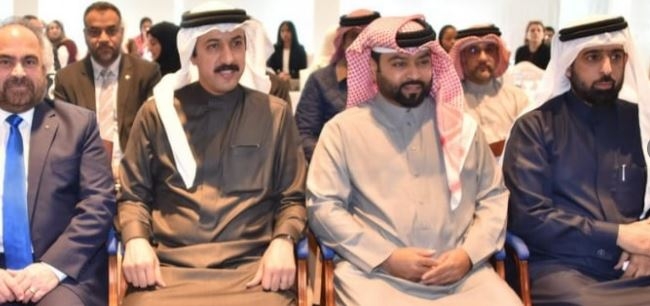Enhancing climate resilience for water in Bahrain workshop inducted
National Oil and Gas Authority (NOGA) Chief Executive Officer Nasser Sultan Al Suwaidi inaugurated the induction workshop for NOGA’s project with the Green Climate Fund, “Enhancing Climate Resilience for the Water Sector in the Kingdom of Bahrain."
The inauguration was held under the patronage of Shaikh Mohammed bin Khalifa Al Khalifa, Minister of Oil and Chairman of the National Oil and Gas Authority (NOGA) Project Implementation Committee.
It was attended by undersecretaries, general managers of government, private institutions and oil companies and specialists in the environmental field.
The workshop was organized by NOGA in cooperation with the United Nations Environment Program (UNEP) to discuss topics that included building different models of climate change and the impact on the water sector, scrutinizing water use, enhancing the utilization of rainwater, developing policies and measures to improve water efficiency in public buildings and building an integrated database.
Al Suwaidi stressed importance of the role of government and private institutions in promoting cooperation in order to implement environmental projects that are in line with the strategy of the Government Action Plan in this regard.
He noted the importance of the project, directly linked to sustainable development goals in the provision of water, sanitation, consumption, production and climate change, as well and with indirect goals such as clean energy, low prices and gender equality.
Al Suwaidi said that climate change has become a vital issue associated with the oil industry because of its impact on the policies of the response measures negatively affecting the oil industry.
Bahrain is a small oil-producing island country negatively affected by climate change due to the threats of flooding its low-lying coastline, which is located in most of its infrastructure, degradation of groundwater caused by the invasion of reservoirs by the sea and an increase in the frequency of dust and dust storms and lack of rainfall.
This situation emphasizes the importance of working seriously to preserve the climatic environment through the implementation of several environmentally friendly projects.
They include NOGA's project in this regard, which came to reduce the negative environmental impacts and to address many global challenges. The project consists of seven major initiatives aimed at enhancing climate resilience for the water sector in Bahrain.
Al Suwaidi addressed the environment study prepared by NOGA that concluded that climate change and specifically the low rate of groundwater mobilization, the creeping of groundwater, and the rise of thermal contribute to the reduction of fresh water supplies in Bahrain by at least 50 to 100 million cubic meters from water annually in the short term.
Water demand in the municipal, industrial and agricultural sectors is expected to rise by about 10 million cubic meters per year by 2030.
Al Suwaidi said the issue of water security is a major challenge for many countries, whether in cases of human disasters such as wars and others, or causes of climate change.
He pointed out that the water of Umm Rudhooma in Bahrain is one of the most important sources during the disasters is a protected layer.
The oil sector plays a pivotal role in the refilling of this reservoir, but this role has been strengthened and developed through the initiative of Tatweer Petroleum Company in 2011, which invested $166 million to improve water quality before injecting it into this layer.
The oil sector has boosted Bahrain's stock in Umm Rudhooma by about half million barrels of water per day, equivalent to 80,000 cubic meters of water (equivalent to 29.2 million cubic meters per year) more than is produces from the Abu Jarjour plant (60,500).
Ayman Shasli, a member of the Board of Directors of the Fund and Chairman of the Arab Climate Change Negotiating Group, spoke about the importance of this project for Bahrain and the region.
He highly appreciated that Bahrain under the management of Shaikh Mohammed has received an approval and an authorization from the Board of Directors of the Green Fund to finance environmental projects in Bahrain, one of the oil producing countries opening the way for other countries to benefit from the financing of environmental projects.
The Oil Minister also confirmed that this project is currently the subject of attention and follow-up from all, hoping that it would be implemented as planned.
"UNEP reaffirms its commitment to strengthening capacities through the provision of technical assistance in the areas of policy and legislation development, scientific capabilities, and increasing public awareness of the impact of climate change, and the creation of investment opportunities," Ataf Shahada said.
"UNEP strives to have a positive and effective impact on human life in the Kingdom of Bahrain and the West Asian region in an inclusive and transparent manner".
Bahrain is the first country in the region to attract the 21st Meeting of the Green Climate Change Fund established at the 16th Conference of the United Nations Framework Convention on Climate Change in 2010.
Its secretariat is based in Songdo, Incheon City in South Korea, where the Fund encourages a paradigm shift towards low-emission development paths capable of adapting to climate change.
The Fund provides support to developing countries to reduce harmful emissions and to adapt to the effects of climate change.
Projects and programmes proposed by developing countries are funded while ensuring that they are managed transparently. The funds are in their entirety contributions from developed countries as well as contributions from developing countries.
Related Posts

